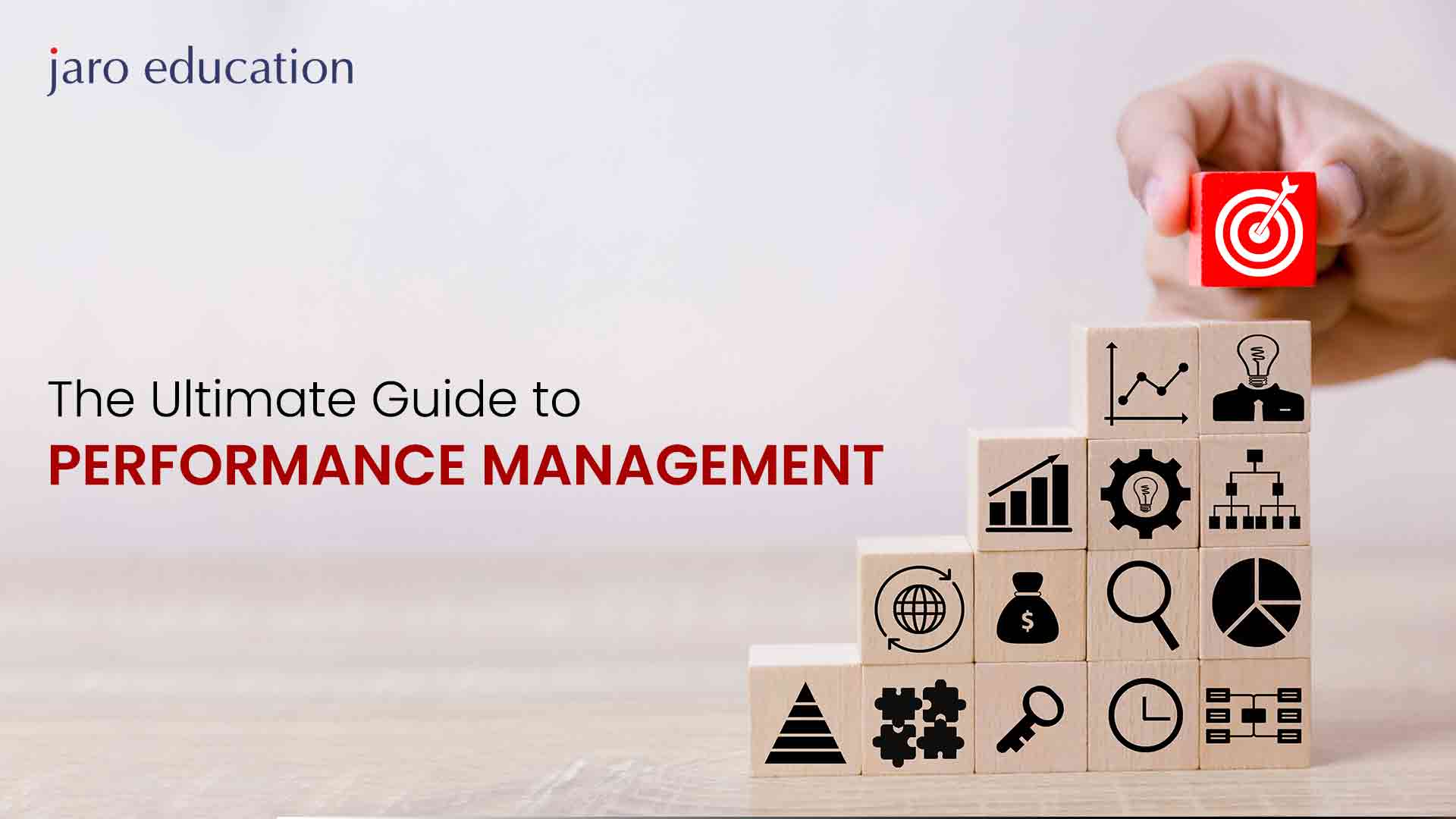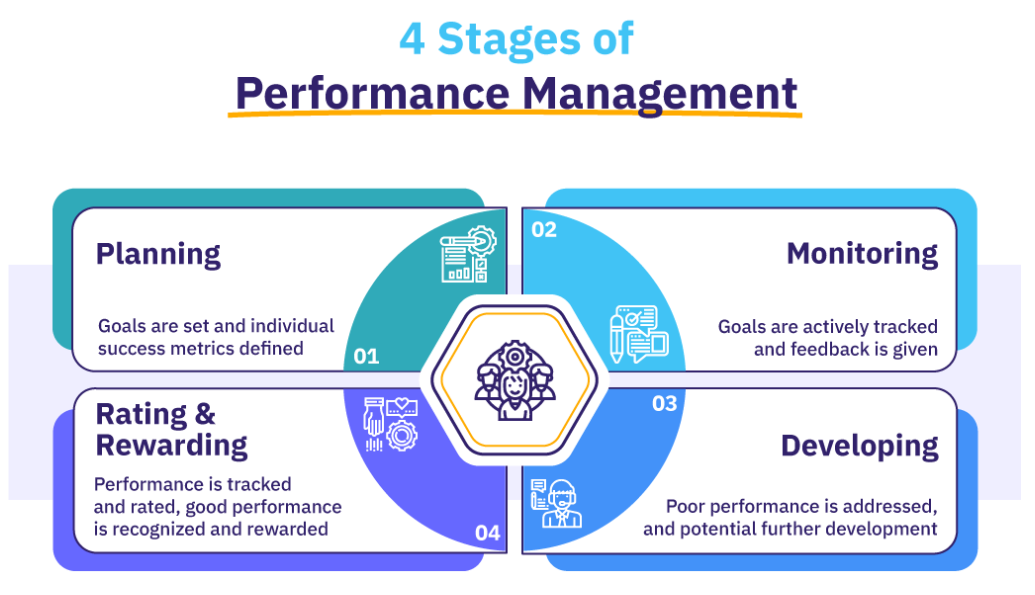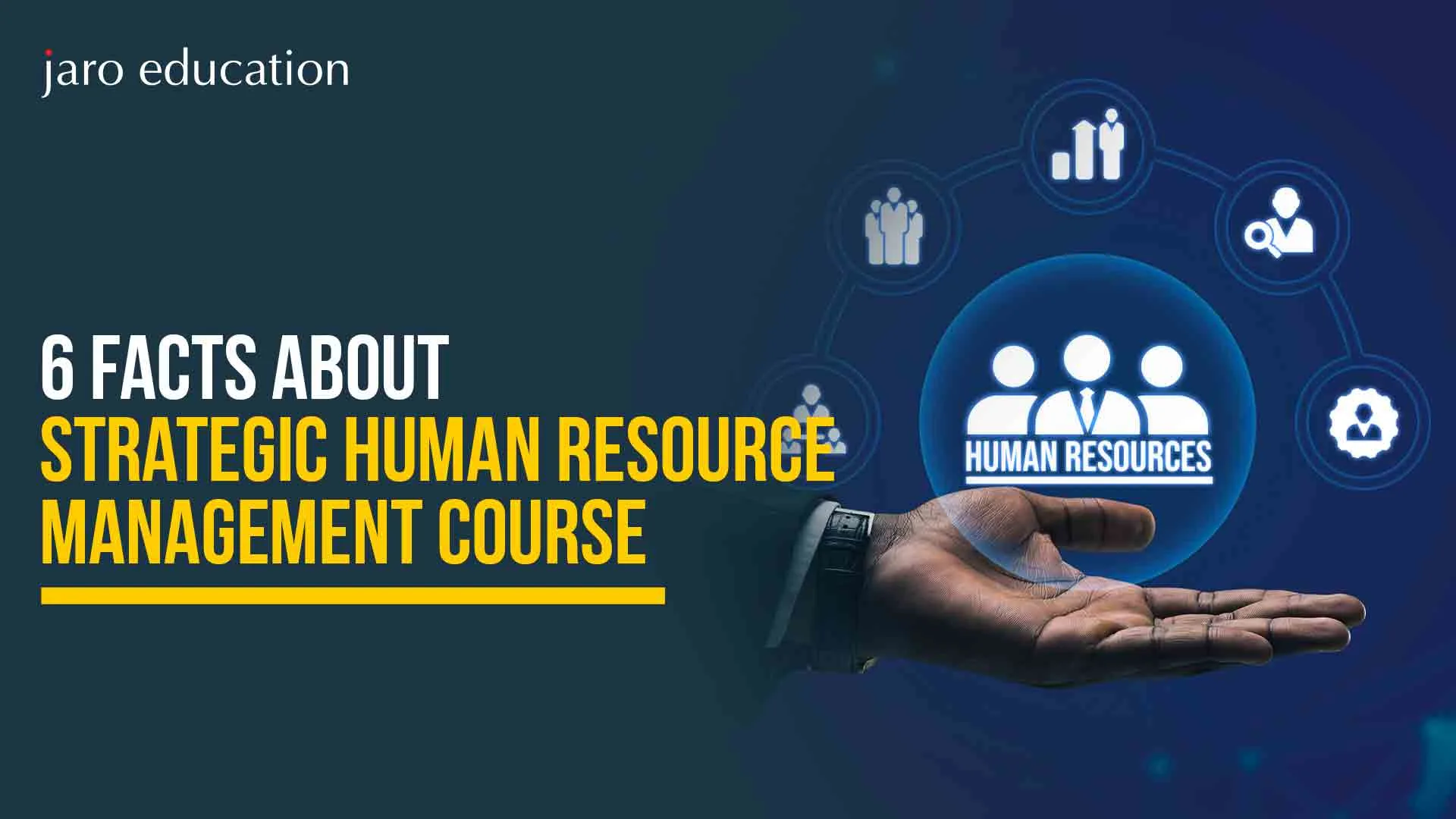The Ultimate Guide to Performance Management
Table of Contents

- jaro education
- 16, January 2024
- 3:48 pm
In the modern workplace, the pursuit of excellence is not just a goal but a necessity. Within such setups, the importance of effective performance management cannot be overstated. Performance management is not merely a process but a strategic approach to managing individual growth and organizational success. This definitive guide aims to illuminate the path to effective performance management, studying the core principles and intricacies of the process. As we embark on this journey, we will explore the critical elements of performance management, highlighting the importance of a well-structured Performance Management System.
Let’s explore the layers of performance management, from its basic concepts to the application of strategic approaches, with the ultimate goal of creating a workplace that thrives on continuous improvement and individual success. This guide is not just a roadmap; It is an invitation to understand, implement, and master the art of performance management.
What is Performance Management?
Performance management is an ongoing collaborative process between managers and employees to plan, monitor, review and improve work objectives and overall contribution.
It ensures employees have clear expectations that align individual goals, priorities and behaviors with the organization’s business needs. This strategic alignment of people and organizational objectives is key to success.
Performance management typically involves:
Setting Measurable Goals and Targets
Managers and employees mutually establish realistic yet challenging goals that relate to wider company goals. Metrics are defined to track progress.
Frequent Progress Reviews
Continuous informal check-ins provide feedback and coaching to keep efforts on track or make timely adjustments.
Formal Appraisal Meetings
Structured annual or bi-annual discussions offer insight into achievements and areas for improvement. Performance is measured against goals.
Development Opportunities
Training, mentoring and job rotations to elevate skills.
Overall, performance management establishes transparency through ongoing dialogues about expectations, progress and growth. Employees understand what success looks like and have support to get there.
This drives higher job satisfaction, engagement, productivity and retention. Strong individual performances collectively contribute to organisational success. It’s a win-win for all stakeholders when done effectively.

What is the Role of Performance Management System?
Performance management has a multifaceted role within an organization. Here is a brief account of the same.
Alignment of Goals
The performance management system enables the alignment of the employees’ goals with those of the organization to get the desired results. Goal alignment produces a synergistic effect that ties employee contribution to organisational success.
Plans for Employee Development
A proper performance management system helps in facilitating the development of an employee development plan, which is crucial to an organization’s success. Since management is about developing people through work, therefore the development of their skills and competencies results in improving individual, team, and organisational competence and performance.
Creates Consistency in Performance Guidelines
The performance management system creates one unifying system that ties the performance goals and objectives of the organization with all the employees. Therefore, employees’ performance criteria for performance plans are driven by a performance management system rather than the subjective judgments of managers.
Creates Data and Information for Better Outcomes
With the help of a performance management system, a company can generate a wide array of data and information that can be used for improving individual contributions, internal business processes, customer processes, technical processes, and gaps in these areas.
Encourages Proactive Communication
A performance management system encourages proactive communication between managers and employees to align goals with business strategy. It helps in clarifying various doubts or gaps and builds effective rapport between managers and employees.
Retains Skill
The performance management system provides opportunities for every employee to excel in their role. This helps identify and develop employees with high performance and high potential.
Challenges and Solutions in Performance Management
As elucidated, performance management forms a pivotal strategy for nurturing individual and institutional success. However, the document recognizes potential impediments in effectively implementing performance-centric frameworks, including
- Resistance to modifying existing workflows
- Inconsistent evaluation metrics
These stand out as key challenges that can impede progress.
To address these challenges, one should stress on solutions rooted in:
- Implement continuous feedback mechanisms to provide much-needed clarity.
- Set organization-wide guidelines and best practices to uphold uniformity across review parameters.
- Build accountability within teams while allowing customized goal-setting as per specific roles.
- Schedule frequent touchpoints with managers to reiterate performance milestones and areas needing improvement.
- Emphasize procedural transparency through consistent structures to manifest adaptability in the face of altering contexts.
- View consistent evaluation not as overbearing oversight but as an enabling scaffolding guiding professional growth.
- Foster psychological safety by using streamlined frameworks to enhance receptiveness to individualized coaching.
- Generate actionable data to inform interventions that proactively convert challenges into development opportunities.
- Onboard performance management to create a definitive impact beyond immediate gains in productivity.
- Structure workplaces where employees feel valued by practicing open communication and ownership at all levels to induce higher engagement and motivation within teams.
Thereby the organisation-wide execution of structured performance management protocols elevates this strategic tool to shape bottom-line results by:
- Driving productivity through clarity of expectations
- Nurturing inspired workforces primed to excel
- Maintaining transparency through regular touchpoints
- Sustaining a culture of collective ownership toward common goals
In totality, an integrated framework overcomes implementation challenges while multiplying the positive reach of performance management across diverse metrics.
Why Should One Study Performance Management?
At every level of an organization, performance management is vital because it affects each individual employee, team, and even the overall success of the company. It’s the instrument that helps people do better work, motivates teams to work well together, and directs the entire company toward its goals.
We’ll examine the effects of performance management in three main areas:
1) Individual employee performance
2) Collaborative team performance
3) Organization’s overall advancement
Employee performance can be aided or hindered by their distinct roles, skills, contributions, and experiences. Their approaches to accomplishing their objectives may differ slightly.
Employee performance is usually impacted by performance management, which makes sure workers have defined priorities and goals, are aware of where they stand with others, and receive regular coaching and feedback from managers.
Rigid organizational hierarchies have been replaced by more adaptable and successful team-based models and cultures in many businesses. Through open, coordinated, and shared goals, team performance raises individual performance accountability and ownership.
Performance management has an impact on team performance by assisting leaders in fostering a culture of feedback that encourages employees to collaborate more effectively and fosters positive relationships among team members.
Ultimately, by enabling employees and teams to excel through clarity, communication and alignment with organizational strategy, performance management elevates overall company success. It ensures everyone across the business is united by shared goals and priorities. When individuals thrive and teams function optimally, organizations progress cohesively toward fulfilling their purpose and potential in a competitive landscape. Performance management connects the dots across people, processes and strategies – catalyzing success at all interdependent levels.
Positive Impact of Performance Management
Performance management is a crucial addition to any venture to successfully carry out various operations. Here is a close account of how performance management impacts a setup and helps take it to the next level.
Employee Growth
As stated in the blog, performance management facilitates employee development by enabling continuous feedback cycles. Clearly outlined goals and regular coaching help individuals understand expectations and track progress. This nurtures professional growth within well-structured frameworks optimized to leverage employee strengths.
Team Dynamics
At team levels, structured performance management protocols promote collaboration by reinforcing organisational objectives. Collective ownership towards common goals is underscored through transparency in review mechanisms. Resultantly, synergistic work relationships unfold, raising accountability through interdependence.
Institutional Development
For institutions, performance management emerges as a strategic apparatus that calibrates human capital to optimize growth. The universal guidelines and best practices streamline workflows, enhancing productivity. Meanwhile, the underlying culture of progress sustains motivated workforces, indirectly multiplying returns across metrics. Thereby, organizations construct adaptive systems poised to excel amid volatile contexts.
A robust performance management process has a definitive and multidimensional impact. It empowers individuals with clarity while informing institutional interventions to nurture success. Concurrently, it refines team dynamics and workplace culture to sustain consistency across fluctuating business landscapes. Thereby, integrated frameworks elevate performance management as a vital driver of change through people processes.
To get work done, workplaces must bring people, systems, and processes together. Teams and individuals are more likely to keep advancing business success when they comprehend how and why their efforts affect organisational outcomes.
Performance management, thus has an impact on organizational performance by assisting companies in fostering collaboration, transparency, and alignment so that teams and all employees are working towards a common objective.
Conclusion
Performance management is an ongoing journey, not a routine process. It shapes a positive work culture where employees grow and organizations thrive. This guide provides direction to empower people and steer continuous improvement. Performance management transcends task-checking. It fuels an organization’s engine toward achieving strategic goals. By enabling open communication and clear expectations, performance management nurtures employee success and forges an engaged, productive workplace.
With a framework for aligned objectives, skill-building, and progress tracking, performance management is the compass guiding an organization’s collective growth. It points towards a future where companies don’t just survive but truly prosper by developing talent.
So, performance management isn’t just procedures. It’s people-centred leadership and culture transformation. It’s the path to unlocking potential – both for individuals and organizations alike.
If you are willing to become a proficient HR who is well-versed in all these essential aspects of performance management and other relevant skills, then you must consider enrolling in a Post Graduate Certificate Programme in Strategic Human Resource Management by IIM Tiruchirapalli, designed by industry experts and thought leaders.
This course utilizes performance management as a powerful apparatus to nurture leadership and optimize talent capital. Participants receive in-depth mentoring on structuring holistic frameworks tailored for contemporary workplaces. Through continuous cycles of goal-setting and aligned review mechanisms, the programme champions clarity of expectations – elevating engagement across teams. Your organisation, too can benefit from strategies focused on retaining top talent and amplifying their productivity. Join India’s front-running management institute to access best practices for accelerating workforce development.











